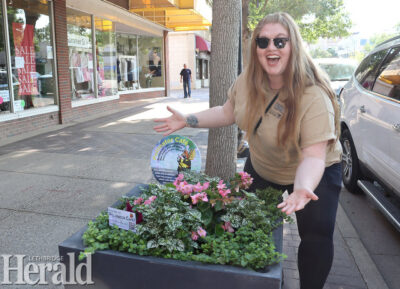Pollinator cafes enhance beauty and biodiversity downtown
By Al Beeber - Lethbridge Herald on August 3, 2022.
 Herald photo by AL BEEBER
Paige Rosner of the Helen Schuler Nature Centre shows one of the pollinator cafes Tuesday on 4 Ave. S.
Herald photo by AL BEEBER
Paige Rosner of the Helen Schuler Nature Centre shows one of the pollinator cafes Tuesday on 4 Ave. S.LETHBRIDGE HERALDabeeber@lethbridgeherald.com
A joint downtown project by several city departments has culminated in the opening of what they call “pollinator cafes.”
The pilot project features more than 40 downtown planters filled with flowers that are not only colourful and vibrant but are also good pollinators. The planters will enhance seasonal pollinator habitat while also helping to create a wildlife corridor that connects pollinators to larger parks, green spaces and yards.
Each planter has a sign reading “Pollinator Cafe – these easy-to-grow “rock star” plants provide food for pollinators. Drought-tolerant annuals that bloom at different times provide food for pollinators all season long.” The plants were specifically selected to provide a food source and habitat for local pollinators.
Paige Rosner of the Helen Schuler Nature Centre said different insects are attracted to different plants, some pollinators being attracted to flowers by their shape and their colour.
Bumblebees, for instance, can’t see red, so a bunch of red flowers may not be as helpful as maybe colours like yellow or orange, Rosner added.
Beatles and ants, which may be unsuspecting pollinators to people, are just as good as other insects, but they need flatter surfaces to pollinate like zinnias, said Posner. And while people love the beauty of butterflies, much-loathed moths are also excellent pollinators and there are 2,000 species of them. In contrast there are only 138 species of butterflies.
Coreen Putman, Helen Schuler Centre manager, said downtown Lethbridge is not normally the first place residents think of when its comes to creating a beautiful green space.
“I’m certain when you all think about nature, and connecting with nature and learning more about nature that maybe downtown Lethbridge you wouldn’t first think of,” said Putman.
But the team involved with pollinator cafes thought this project would the perfect opportunity to create a unique space that would attract people downtown to learn more about nature, Putman said.
“We are drawn to nature because we are nature as well. And so things like trees and plants they help to provide space for us to feel welcome, they provide spaces for us to feel more relaxed and to want to connect and to spend time,” she said.
Putnam said the project provided “a perfect opportunity to take some of the knowledge and the understanding that we have of our natural systems and to create an opportunity where we could actually provide back to those natural systems and provide for the organisms, primarily the pollinators,” she added.
“We’re pretty happy now that downtown is not just a wonderful place to visit, not only a place to live and play and celebrate but it’s also going to be a wonderful place to come and connect with nature and learn more about nature,” Putman added.
Departments collaborating on the project include Urban Revitalization, Opportunity Lethbridge, Lethbridge Parks and the Helen Schuler Nature Centre.
“Each of our departments brought a unique perspective and also brought some expertise in different areas,” she said.
Urban Revitalization and Opportunity Lethbridge brought expertise that includes human needs and how they can be met through planning and urban design, while Parks provide knowledge on plants that are easy to purchase and to source, Putman said.
The nature centre brings a wealth of knowledge about pollinators, what attracts them, their needs, different points of their life cycle and how to combine that into an educational program, she said.
People can learn more about things they can do on their own decks and patios through the project.
Comprising a pollinator cafe, she said, are easy-to-grow annuals and plants that not only beautiful but “that actually provide services for pollinators, as well.
Signage features the work of local artists with info on what is attracted to pollinators and what they’re benefitting from. Photos from a local biologist feature QR codes that when scanned take people to the iNaturalist app so they can engage in citizen science as part of the cafe experience, said Putman. A QR code can also be scanned to access a planting guide.
“This is a helpful tool that people can then take with them to a garden centre or when you’re planning your patio,” added the nature centre manager.
Andrew Malcolm, Urban Revitalization manager, said one pillar of the 2007 city master plan was sustainability so the city has been trying to focus on how to include it in some revitalization efforts.
“When this opportunity came forward, we were really excited,” said Malcolm.
In the past two-and-half years, all the downtown planters have been replaced. Those planters were actually repurposed garbage containers from the 1980s and weren’t designed to be planters, he said.
The new ones are self-watering with a basin at the bottom that’s filled every three weeks so they don’t have to be maintained on a daily basis, said Malcolm. This cuts down on annual maintenance costs, he said.
Rosner said the QR code on signage will take people to a long list of annual plants and categorizes them based on what pollinators will be helped by planting them.
Putman said the plants listed will easily be accessed in garden centre. They will not only look bold but will be functional, as well.
Follow @albeebHerald on Twitter
29-28




